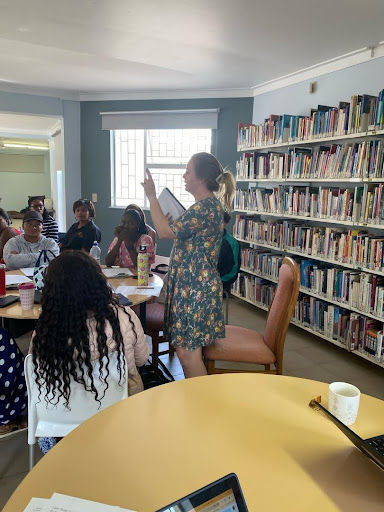Kurt Hahn and the foundations of the WIS approach to education
- Windhoek International School
- Oct 27, 2023
- 4 min read
Dear Community,

At WIS, we believe that every student should be encouraged to be self-directed learners who have a passion for knowledge and a drive to explore what the educational reformer Kurt Hahn called our ‘grand passions’. This past week was certainly a time when students’ self-discovery was fully on display:
Our Grade 9 students will return tomorrow from a weeklong whitewater canoeing journey down the Orange River.
Today, our netball teams are playing in the Gravity Cup.
Tomorrow, we have many students participating in the Pupkewitz swimming gala.
This weekend, many of our teachers and students are participating in the Breast Cancer Awareness March set to take place in Eros.
This morning, the faculty received a briefing from our student council about how they plan to combat littering on the WIS campus.
The Primary Assembly focused on sustainability and student action.
I could go on and on with such a weekly list. There is always more happening at WIS than I am able to keep track of! When you have 469 agentic learners and 70 passionate educators, all sharing the same learning principles and feeling empowered to make a difference in their world, lots of good things start happening everywhere and seemingly all at once.
Whether we realise it or not, Windhoek International School’s principles of education are greatly inspired by the wisdom and work of a 20th-century German-born educator named Kurt Hahn. Born in 1886 to a wealthy Jewish family in Berlin, he was sent to an authoritarian and rigidly academic school where everything was laser-focused on the ‘Abitur’ - the test required to matriculate into university. Hahn passed his Abitur and went on to study at Oxford, and then after the First World War decided to start a school that he envisioned would build character.
The first school that Hahn founded was Schule Schloss Salem, in 1920, where he established what he called the Seven Laws of Salem:
First Law: Give the children opportunities for self-discovery
Second Law: Make the children meet with triumph and defeat
Third Law: Give the children the opportunity of self-effacement in the common cause
Fourth Law: Provide periods of silence
Fifth Law: Train the imagination
Sixth Law: Make games important but not predominant
Seventh Law: Free the sons of the wealthy and powerful from the enervating sense of privilege
At Salem, Hahn was imprisoned by the Nazis in 1933, after he urged his students and young graduates to resist the growing power of Adolph Hitler. An appeal by the British Prime Minister facilitated Kurt Hahn’s release, and he then moved to the United Kingdom where he founded Gordonstoun School, in Scotland.
At Gordonstoun, Hahn founded the Round Square Initiative (a forerunner to our school’s own Global Alliance we recently formed with the International School of Paris, Annie Wright Schools in Tacoma Washington, and the International School of Western Australia). At Gordonstoun, Hahn further articulated his approach to education which was based upon four “pillars”: internationalism, challenge, responsibility, and service.
It was during this time that when asked what the purpose of education was, Hahn replied, “I regard it as the foremost task of education to ensure the survival of these qualities: an enterprising curiosity, an undefeatable spirit, tenacity in pursuit, readiness for sensible self-denial, and above all, compassion.”
After World War II and with the rise of the Cold War, Kurt Hahn founded the United World College (UWC) movement, and was influential in the establishment of the International Baccalaureate - a curriculum that was well-rounded and designed to educate future leaders who develop into “inquiring, knowledgeable and caring young people who help to create a better and more peaceful world through intercultural understanding and respect.”
Kurt Hahn’s belief that students should explore their passions deeply, gave birth to what is now the IBDP Extended Essay. In the 1990s, his philosophy was further developed here in Windhoek when WIS became one of the first schools to develop and implement what are now the IB Primary Years Programme Units of Inquiry.
While serving as the headmaster at Gordonstoun, Hahn founded what would become Outward Bound and then the Duke of Edinburgh International Award for Young People. About these experiential learning organizations, Hahn mentioned in a speech a few years before he died, “I regard it as the foremost task of education to ensure the survival of these qualities: an enterprising curiosity, an undefeatable spirit, tenacity in pursuit, readiness for sensible self-denial, and above all, compassion. We must face the fact that many young grow up at the mercy of surroundings which do not transmit incentives to develop” these qualities.
Now at WIS, our Outdoor Education Trips, our After-school activities and Sports Teams, and our approach to character development are less focused on winning than they are on the development of character - what we call the IB Learner Profile.
We know that intrinsically motivated students become adept at asking and answering the four questions that can turn any challenge into a learning experience:
What is my goal?
What am I going to do to achieve my goal?
How will I know if I’m successful?
Did we get the job done or not? What might I do differently next time?
Ethan Van Drunen
Director





Comments